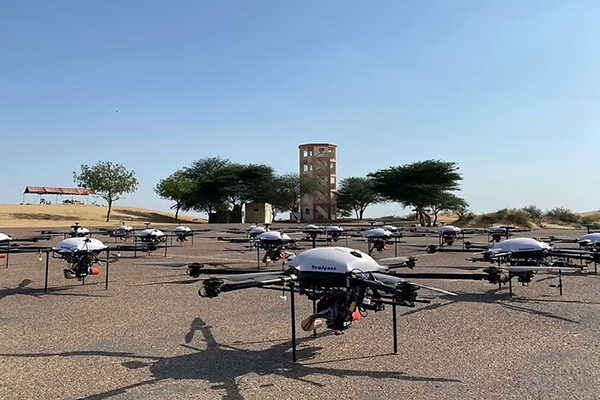With the Ministry of Defence (MoD) ensuring that emergency financial powers allocated to the armed forces for quick contracting of weapon systems aren’t used for imports, a significant opportunity has opened up for domestic companies, with officials saying that dozens of proposals are under discussion and the focus is on industry-led design and development.
Last month, MoD gave approvals that will help the three armed forces quickly procure weapons and equipment up to Rs 300 crore per order, with deliveries to be ensured within a year.
It is learnt that several dozen projects are under discussion, with the private sector set to deliver a variety of weapons including swarm drones, long-range rockets, next generation mines, armed unmanned aerial vehicles and artificial intelligence-enabled systems.
Officials say that the focus will be on industry-led design and development, with proposals already received from companies. A high-level meeting in South Block this week is expected to further accelerate this process, for which the government has already allocated 25% of its annual research and development budget.
One of the proposals under discussion is a new tactical surface-to-surface missile, which will be a first of its kind project to be developed by the private sector. Being proposed by Economic Explosives Ltd, the 250 plus km range missile would be exponentially cheaper than the Brahmos and is fully indigenous. The ministry is also reviewing a proposal by the same company for guided Pinaka rockets, with a range of up to 150 km and new generation mines.
“We have in the past six months offered 15 Suo motu proposals including loitering munitions, surveillance drones, counter drone systems, drone-based mine detection and neutralisation systems, state-of-the-art anti-tank mine and long-range multi-launcher rocket systems that are being studied by the armed forces,” EEL chairman Satyanarayan Nuwal told ET.
The bar on imports under the emergency route was imposed after several rounds of internal discussions where it was agreed that capacity exists in the domestic sector to deliver on urgent requirements of the armed forces, officials said.
Another proposal being reviewed is for armed unmanned aerial vehicles that will be manufactured in the country at a fraction of import costs. The armed high-altitude long endurance drone is being developed by Adani Defence that already has a joint venture with Israel’s Elbit Systems. Sources said that it was being pitched as an indigenous and much more affordable substitute to the stalled proposal for armed Predator MQ 9B drones from the US.
The industry is also offering high-technology innovations to the armed forces, with IIT Delhi incubated start-up Botlab Dynamics in advanced stages of developing a path-breaking 3,500 swarm drone system. The company, which is currently looking for capital to expand operations, has submitted proposals for unique systems like disposable drones that can be used for quick surveillance by special forces, co-founder Sarita Ahlawat told ET.
Ministry officials say that the industry can be further accelerated on a public private partnership basis, with the private sector bringing in innovation and the public sector offering testing and manufacturing facilities that have been created over the years.
The corporatisation of the Ordnance Factory Board has allowed its newly created entities to create private sector partnerships and changes are expected in other large public sector units to gear up for a similar future.
A public private partnership that is showing results is the development of a high-altitude pseudo satellite that is being partially funded by the ministry. The project is being led by Newspace Research along with Hindustan Aeronautics Ltd.
“The long-term focus should be on captive R&D for futuristic products within our country in a public private partnership format to develop next generation military hardware, which is a far bigger deal. Mandated PSUs can exploit the tech prowess and agility of start-ups to create the right impetus for next generation military products,” Newspace Research’s Sameer Joshi says.
Ministry officials say that the recent geopolitical situation has reaffirmed the need for self-reliance, given the uncertainties in supplies and spares due to the Russia-Ukraine crisis. Dependence on foreign sources for vital equipment, they say, can be leveraged and impact strategic sovereignty of the country.


















